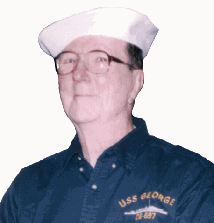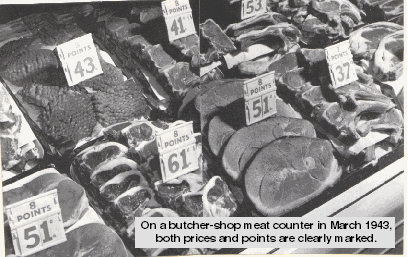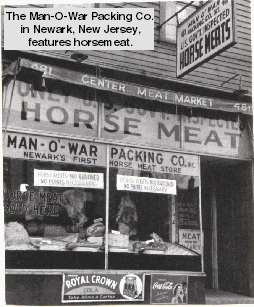|
|
|
|
|
|
|
|
|
|
|
|
|
|
|
|
|
|
|
|
|
|
|
|
|
|
|
|
|
|
|
|
|
|
|
|
|
|
|
The People News, a free newspaper serving Cleveland Tennessee (TN) and Bradley County Tennessee (Tn).
Of Bradley County Tn.
AUGUST 2007
The People News, a free newspaper serving Cleveland and Bradley County Tn.
|
|
|
|
|
|
|
HOME
|
|
BACK ISSUE ARCHIVE
|
|
EDITORIALS
|
|
LETTERS
|
|
CONTACT US
|
|
|
|
|
|
|
|
|
|
|
|
Fourteen Points and Four Red Stamps
|
|
|
|
|
|
|
|
Bizarre, Fascinating, and Wacky World War I & ll Secrets.
|
|
|
|
|
|
|
|
|
|
|
|
by Cecil Owen
"My name is Janet Maryjean La Brancheski and I live at 19512 Forrer Ave in Glendale, Arizona. I am 29 years old, and I weigh 114 lbs., and I am 5 ft - 4 ins tall. I have pretty blue eyes, and I have light brown hair. My sister and I share a small cottage at the end of the road. The time is May 6, 1942, and the place is the Glendale Elementary School. There is a long line of people waiting to be processed, for World War Two has descended upon the United States of America and I, Janet Maryjean, will be your host to guide you through the proper procedures. For I am an office clerk in the OPA (Office of Price Administration) which is in charge of the whole operation. Today we are taking depositions to determine how much sugar you have on hand. Then ration books containing enough stamps for a 52 weeks supply will be issued. Each person will be allowed 10 ounces of sugar per week."
Each person was issued two ration books. One contained blue stamps for canned food and the other book contained red stamps for meat, fish and dairy products. Special stamps in the back of the book specified what the stamp was for. For example, the sugar stamps had "sugar" printed on the stamp. Each person was allowed 48 blue points (stamps) and 64 red points per month. So a housewife shopping for a family of four could use 192 points. The OPA had a very tedious and frustrating job regulating rationing for the entire country. It printed three billion stamps per month. The OPA operated through 5,500 local rationing boards. One employee for a while was Richard Nixon, before he accepted a Navy commission. The OPA was everybody's favorite wartime scapegoat. If anything went wrong it had to be the fault of the OPA. People
|
|
|
|
|
|
|
|
|

|
|
|
|
|
|
|
|
|
|
|
|
|

|
|
everywhere were delighted when it made a mistake like the OPA office in Philadelphia. It forgot to ration sufficient heating oil for itself and had to close down temporarily. To prevent hoarding, the stamps were coded and good for a month's time only.
Janet continued, "I did drink at least five cups of coffee a day, but one person is only allowed one pound of coffee every five weeks. And you must be at least 16 years old to be able to buy coffee. My sister and I were always heavy meat eaters, we liked it with every meal, but it was kind of weird to shop for meat. Each cut requires a different number. A beef roast cost only one stamp last week, but cost three stamps this week. And sometimes, even if you have the stamps and the money, the butcher has run out of beef."
|
|
|
|
|
|
|
|
|
|
|
Because of the shortages special meat markets sprang up that sold buffalo, antelope, deer, beaver, rabbit, and also horse meat. None of these different kinds of meat were rationed. Beef was 55¢ per pound with stamps, while horse meat was only 20¢ per pound and no stamps. (If horse meat is cooked the same way as wild game, it is very delicious. In fact it tastes just like beef, but it is a little coarse-grained.)
Janet sighed and shrugged her shoulders, "I had to give up smoking, for cigarettes have become very scarce because most of them are reserved for our armed forces."
A serviceman could buy a pack for five cents and a whole carton for fifty cents. When a civilian bought cigarettes, he was limited to only two packs (if the store had any to sell). Many stores posted a sign "no cigarettes," but if you were a regular customer you
|
|
|
|
|
|
|

|
|
could buy "black market stoopies." You could stoop down behind the counter and secretly buy a pack or two.
One pound of butter was a whole month's supply, so housewives began to use oleo instead (it was white and you had to color it yourself). Oleo was something similar to our margarine of today. Civilians were allowed two pair of shoes per year (Because the army alone needed fifteen million pairs of combat boots). Men on the home front proudly wore "victory suits," which used to have two pair of pants. Now they had only one pair. The suits had no vests, cuffs, belt, loops, lapels, or pockets. The coat or jacket had to be very short, no long tails. You were allowed three victory suits a year. Also by OPA decree, women's skirts must end one inch above the knees, and no more full length one piece bathing suits, the entire middle must be cut out. Women's silk stockings quickly vanished because the silk was needed to make parachutes. Many women ran a black marker down the back of their legs. This was supposed to look like the seam of a silk stocking.
On February 2, 1942 the OPA informed all of the automobile industry that they could manufacture no more civilian cars until the war is over. Soon whiskey began to disappear from the store shelves and in the saloons also. (Alcohol was
|
|
|
|
|
|
|
|
needed to make high explosives.) This was not good, for wartime jitters and booming wages had increased hard drinking at least thirty percent. Soon an inferior substitute began to appear called "ole spud." It was a kind of whisky made from alcohol distilled from waste potatoes. Many old timers claimed that it tasted worse than rotgut moonshine.
Even America's boys and girls were touched by the war. As their rubber balls, tricycles and baby buggies, all made of critical war materials, disappeared for the duration. They pitched in with great enthusiasm to help out with the war effort. They made clothes for the kids in war-torn lands, and knitted socks for our servicemen overseas. Some even went out into the fields and collected milkweed pods. The fluffy insides were used to fill life jackets.
In classrooms all over the land, kids bought war stamps and war bonds. In one year alone, with their nickels and dimes, they bought 11,700 parachutes, 2,900 airplanes, and 44,000 jeeps. They were equally enthusiastic in their scrap drives, collecting newspapers, scrap metal, tin foil, and old tires. In just five months in Chicago alone, kids
|
|
|
|
|
|
|
|
collected 18,000 tons of newspapers. Kids even saved the weekly fats and greases from their mother's kitchens. These were collected because they contained glycerin for high explosives.
In just three weeks, kids and adults together collected five million tons of pots and pans, horseshoes, old car bumpers and various other metal objects.
Of course, there is always a few holdouts, like the one in Valparaiso, Indiana. The junkman Frank Schumak was hoarding 200,000 pounds of scrap metal. "I am saving that for my old age," he said. So he refused to sell it to the government for their price of $18.75 a ton. Finally, as a last resort, army military police came and confiscated his whole metal scrap pile.
Gasoline rationing started on May 5, 1942, and it was a very elaborate system. Each motorist was issued a windshield sticker with a different letter of priority. If your car was used for pleasure driving only, you received an "A" sticker. It was worth three to five gallons a week, depending on what region you lived in. A "B" sticker was for commuters. Gas amount was gauged by the distance from your work. An "E" sticker was for emergency vehicles; policemen, firemen, ambulance drivers, and clergymen. And of course their supply of gas was unlimited. Naturally, many high politicians received an unlimited supply also.
Soon there were shortages of many things everywhere. In every large city where defense plants existed, the biggest shortage was a place to sleep. Many workers were sleeping in their cars or under big trees. New houses were being built every day but it was impossible to keep up with the demand. Soon a peculiar sign appeared in the windows of many homes which read, believe it or not, "hot beds for rent - 25 cents per eight hour shift." In other words, a person could rent a bed to sleep in for only eight hours. Then you had to get up and go to work and someone coming off shift would sleep in your bed for the next eight hours. So for three shifts around clock, three people shared the same bed.
A favorite story was told by Henry F. Pringle, a writer for the office of war information. A man was drowning in the Pontomac river, and his cries for help were heard by a passerby, who rushed over to the river bank and said, what is your name and where do you live? The drowning man gasped frantically, "my name is John Jones, and I live at 14 North "S" Street... please help me." But the passerby left immediately and ran all the way to John Jones address. He told the landlady breathlessly, "quickly, I want to rent John Jones room because he has just drowned." "I am sorry," replied the landlady, "it was just rented by the man who pushed him in."
Sources:
World War Two 4,139 Strange and Fascinating Facts - Don McCombes and Fred L. Worth.
World War Two Time-Life books: The Home Front U.S.A. - Ronald H. Baley.
.
|
|
|
|
|
|
|
HOME
|
|
BACK ISSUE ARCHIVE
|
|
EDITORIALS
|
|
LETTERS
|
|
CONTACT US
|
|
|
|
|
|
|
|
|
|
|

|
|





